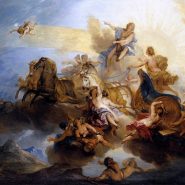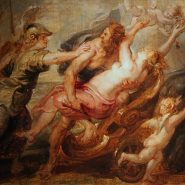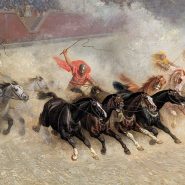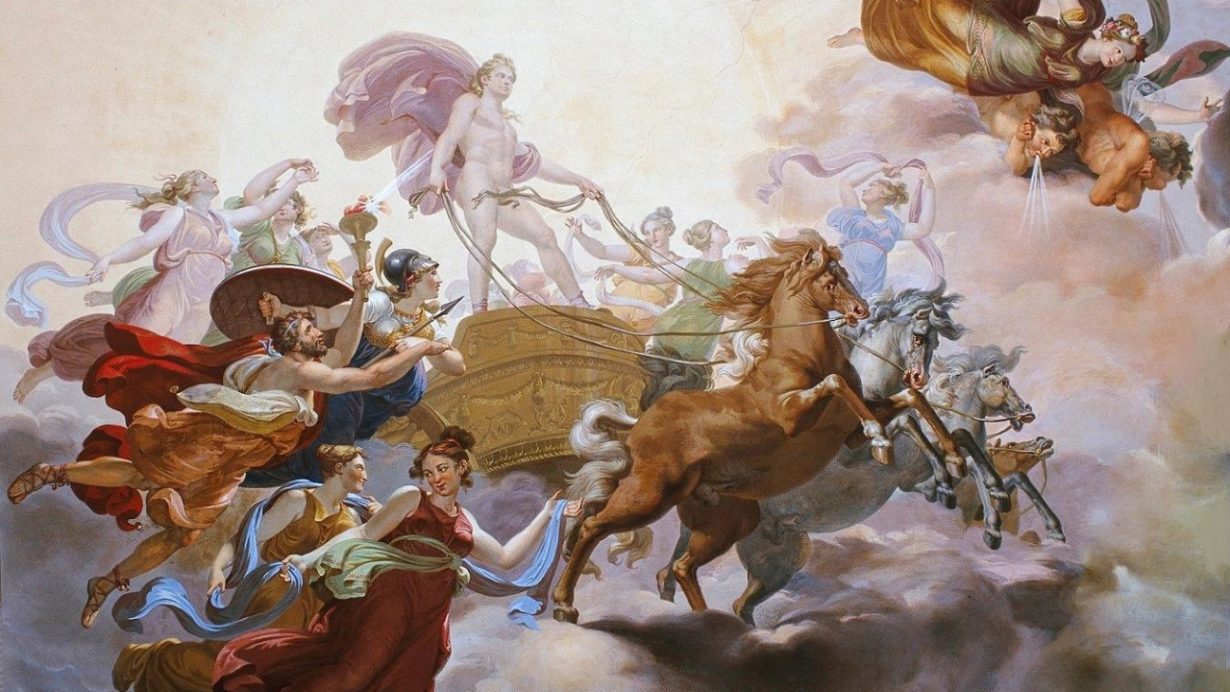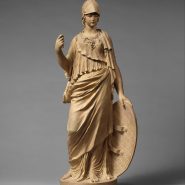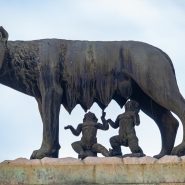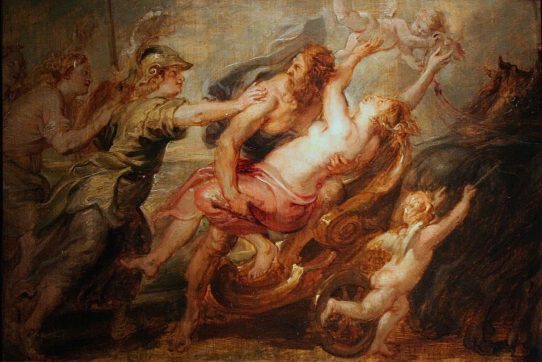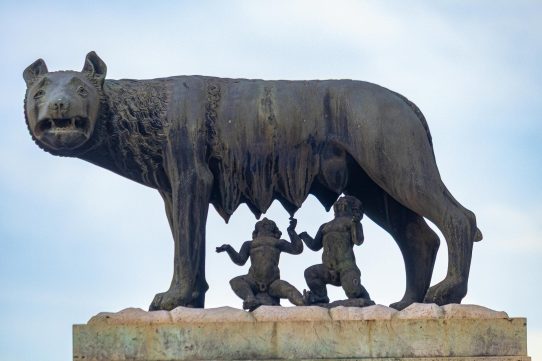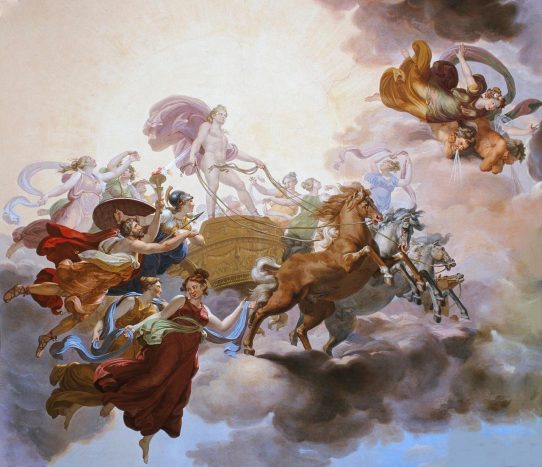Overview
In the beginning, before earth, sea, or sky had taken shape, the universe was an immense void — a swirling chaos of elements without order or name. Darkness veiled all things, and matter lay unformed, a mingling of fire and frost, weight and wind, struggling without harmony.
Yet within this chaos stirred a divine principle: the spark of creation, the breath of order that would soon divide the confusion into the realms of heaven and earth. From this awakening came the birth of the cosmos, the shaping of the world, and the rise of the gods who would govern it for eternity.
The Birth of the Cosmos
According to the oldest Roman traditions, drawn from both Italic lore and the echoes of earlier myths, the shaping of the world began when a divine force separated the light from the darkness, the heavens from the earth, and the sea from the land.
The upper air rose pure and bright, forming the home of the gods, while the heavier elements sank to become the fertile soil of mortal life. Rivers were given their courses, mountains their summits, and the stars were hung in the firmament to mark the order of time. Nature, once chaotic, became harmonious — each part moving in balance with the others, bound by the unseen law of divine reason.
In this moment of balance, the first divine beings arose — the Dii Consentes, the harmonious twelve who would later guide the world’s order. Among them were the great powers who personified creation’s forces: Terra (Earth), the nourisher of life; Caelus (Sky), her consort and canopy; and Oceanus, whose endless waters girded the world. From them descended the generations of the gods, their struggles and triumphs shaping the destiny of both immortals and men.
The Age of Saturn
After the first division of heaven and earth, the god Saturn emerged as ruler of the world. He was a deity of abundance and peace, who reigned over the Golden Age — an era when the earth bore fruit without labor and humankind lived in harmony, unburdened by war or greed.
Justice walked among men, and nature’s bounty was shared by all. But Saturn’s rule was destined to fade, for prophecy foretold that one of his children would overthrow him. To prevent this fate, he devoured each child at birth — a desperate act to preserve his throne.
His wife, Ops, mourned the loss of their offspring, until at last she hid the youngest, Jupiter, and gave Saturn a stone wrapped in cloth in the child’s place. When Jupiter grew to manhood, he confronted his father and forced him to release his swallowed children: Neptune, Pluto, Juno, Ceres, and Vesta. United, they rose against Saturn and the elder generation of Titans, casting them down and establishing a new divine order. Jupiter took the heavens as his realm, Neptune the sea, and Pluto the underworld.
Thus began the age of the Olympians — a new dynasty of gods who would govern the cosmos with might and reason.
The War of the Titans
The rise of Jupiter and his siblings was not without strife. The Titans, ancient beings of vast power, refused to yield their rule.
Led by Atlas and the monstrous Typhon, they waged war against the younger gods for dominion of the universe. The battles raged across heaven and earth, shaking the mountains and setting the seas aflame. Lightning split the sky as Jupiter hurled his thunderbolts, Neptune’s waves swallowed entire lands, and Pluto unleashed the terrors of the deep earth.
For ten years the war endured, until at last the Titans were defeated and cast into Tartarus — the shadowed abyss beneath the world. Only Atlas was spared execution, condemned instead to hold up the sky for all eternity.
From their victory, the Olympian gods forged the laws of heaven and nature. The seasons began to turn, life took form upon the land, and humanity emerged to inherit the earth. The reign of chaos ended; the age of divine order had begun.
The Creation of Humanity
When peace returned to the heavens, the gods turned their eyes to the world below.
Prometheus, a Titan who had sided with Jupiter in the war, shaped the first humans from clay and water. Minerva breathed life into them, granting them reason and thought, while other gods bestowed gifts of speech, craft, and music.
Yet humankind was frail and cold beneath the stars, so Prometheus stole fire from heaven and gave it to them, teaching them to build, forge, and survive. His gift brought light and progress but angered Jupiter, who feared that mortals would grow too proud. As punishment, Jupiter chained Prometheus to a lonely crag, where an eagle devoured his liver each day until he was later freed by Hercules.
To balance the gift of fire, Jupiter commanded Vulcan to fashion Pandora, the first woman, whose beauty concealed a divine trap. When Pandora opened her jar, evils flew forth into the world — pain, sorrow, and death — leaving only hope behind. Thus began the mortal struggle: the eternal tension between divine favor and human ambition.
The Establishment of Divine Order
With the cosmos complete and the gods enthroned, Jupiter declared the laws that would govern all things. The heavens would follow their courses, the seas their tides, and the earth its seasons.
The gods took their stations: Mars to guard the state, Venus to inspire love and renewal, Minerva to guide the mind, and Vesta to keep the hearth aflame. Neptune ruled the waters, Pluto the shadows, and Mercury carried messages between worlds. Above them all, Jupiter held the balance of justice, ensuring that the harmony born from chaos would never again be broken.
Through their order, the world endured — a reflection of divine wisdom made manifest in the rhythm of creation.
Legacy and Meaning
The Roman creation story was not merely a myth of origins; it was a moral vision of the world. It taught that harmony arises from conflict, that power must yield to wisdom, and that the laws of heaven mirror the laws of virtue. The struggle between Saturn and Jupiter symbolized the passing of ignorance into understanding, of nature’s wildness into civilization.
To the Romans, the cosmos itself was a kingdom governed by justice, where every storm, star, and harvest bore witness to divine order. The gods were not distant creators but active guardians — sustaining the delicate balance of the world and the destiny of humankind.
Gods involved: Jupiter, Neptune, Pluto, Saturn, Ops, Minerva, Vulcan, Venus, Mars, Vesta, Mercury.
Adapted from public-domain materials, including Project Gutenberg and Wikisource.
